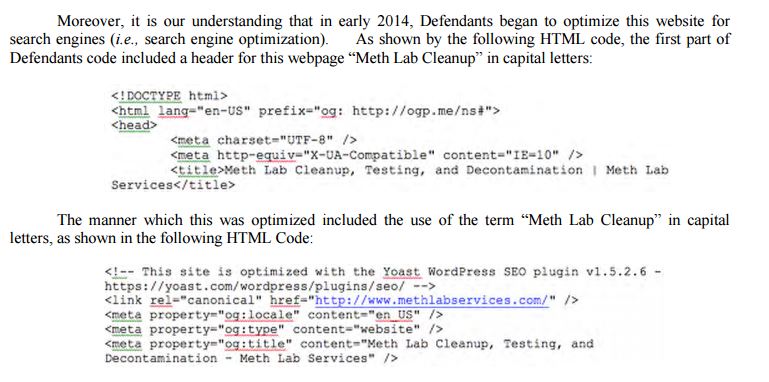What’s Worse Than Cleaning Up A Meth Lab? A Trademark Injunction Against Using “Meth Lab Cleanup” In Metatags
Opinions like this make me really crank-y. The litigants compete in the meth lab cleanup business. The plaintiff has registered trademarks for “Meth Lab Cleanup LLC.” Right away, we already know that weaponizing highly descriptive terms like that can cause legal mischief and produce dubious outcomes. So perhaps the rest of this post shouldn’t surprise you that much.
A previous lawsuit between the parties resulted in a confidential 2011 settlement agreement. The defendant agreed not to use the trademark or colorable variations “in connection with any trademark, service mark, trade name, logo, design, Internet use, website, domain name, metatags, advertising, promotions, solicitations, commercial exploitation, television, webbased or any other program, service, or otherwise.” However, in a tautological nod to descriptive fair use, the defendants could “continue to use the term ‘meth lab cleanup’ to generally describe the nature of services offered by Spaulding Decon, subject to the limitation, and that such use is not an intellectual property infringement.”
In 2014, the plaintiff sent a C&D because the defendants’ website www.MethLabServices.com “has metatags using the capitalized phrase ‘Meth Lab Cleanup.'” The defendant sent a conciliatory reply to the C&D, including a promise to remove the metatags. For reasons the court doesn’t explain, the defendant nevertheless kept using the metatags. This ruling addresses whether that continued metatag usage breached the 2011 settlement agreement.

Photo credit: “Pretty teenager girl with surprised expression over blackborad with signs” // ShutterStock
The Metatags are not seen by the general public viewing a website, and the purpose of the Metatags is to optimize the search engine results, and otherwise direct potential customers to the Website. Reading the [contract] provision in conjunction with the specific limitations imposed on Defendants, and taking into account the [contract] provision’s specific use of the lowercased version of the phrase “meth lab cleanup,” it is clear that it was not the parties’ intent to permit the Defendants’ current use of the Metatags.
Based on that finding, the court concludes the “Defendants must remove and are enjoined from using the Metatags on the Website or the capitalized phrase ‘Meth Lab Cleanup’ or any confusingly similar phrases on any other website.”
Earlier, the court defined the term “Metatags” as “Meth Lab Cleanup” with title caps. Elsewhere, the court expressly said that the defendant can use the lower case term “meth lab cleanup” in the metatags.
* * *
FFS, it’s 2015. Are litigants really still bringing federal cases over “metatags”? That alone deserves merciless mockery, but this case stands out compared to recent metatags case for three reasons.
1) No one seems to acknowledge the different types of “metatags”
As everyone reading this blog knows, the term “metatags” is inherently ambiguous because there are many types of metatags, each with different technical properties. Despite this, the litigants’ summary judgment briefs use the term “metatags” indiscriminately (and painfully, the defendants’ brief also uses the term “meta-data,” apparently interchangeably), and the plaintiff’s (not very) expert report generically discusses “metatags” but seems to be describing keyword metatags.
Perhaps not surprisingly, this loose terminology confuses the court. The court cites to keyword and description metatag precedent and describes the technical attributes of keyword and description metatags. If the court thinks it is talking about keyword metatags, and if we feigned ignorance to assume keyword “metatags” affect search engine rankings, would the court’s distinction between lower case or title case keyword metatags make sense? No, but if we’re hypothesizing a fictional world where keyword metatags matter, why not create more fiction and assume capitalization matters too?
2) This case involves title tags, but apparently no one discusses that
The defendants actually used the term “Meth Lab Cleanup” in title tags, not keyword metatags or description metatags. Title tags work differently than other metatags in ways that matter. For example, when the the judge says “The Metatags are not seen by the general public viewing a website,” that’s factually wrong. Title tags show up at the top of the page (the actual visibility varies by browser), and often the title tags are displayed verbatim to consumers in the search results. Yet, in my limited review of the filings, I didn’t see the word “title tag” come up at all. And as far as I know, any search engine credit for terms in title tags doesn’t vary based on whether the term is title case or lower case.
3) The title tag clearly constitutes descriptive fair use
For reasons not clear to me, the court didn’t quote the exact language in the title tag. However, you can see how it’s presented in this screenshot from the plaintiffs’ summary judgment motion:
As you can see, the title tag reads “Meth Lab Cleanup, Testing, and Decontamination – Meth Lab Services.” This looks like about as clear an example of descriptive fair use as I can imagine; and in context, there’s zero chance that consumers will somehow think the plaintiff sponsored or endorsed the “Meth Lab Cleanup” usage.
Furthermore, the contract permitted the defendant to “generally describe the nature of services offered by Spaulding Decon.” Isn’t that exactly what the defendants did in the title tag? Taken to its logical extreme, it seems like the court would be perfectly fine if the defendants tweaked the title tag to read “Meth lab cleanup, testing, and decontamination – meth lab services”? Is that really what the litigants are fighting over?
Implications for Trademark Settlement Agreements
The defendants made their situation more difficult because they agreed in the 2011 settlement agreement not to contest the trademark’s validity. If you agree to such restrictions in a trademark settlement agreement involving a descriptive trademark, be prepared for future regret. More generally, defendants should be really careful about settlement agreements that restrict their ability to use particular online marketing technologies. We’ve seen numerous cases where ordinary technological evolution makes it easy for a defendant to potentially fall out of compliance. See, e.g., litigation over post-settlement broad matching.
Case citation: Meth Lab Cleanup, LLC v. Spaulding Decon, 2015 WL 4496193 (M.D. Fla. July 23, 2015)

